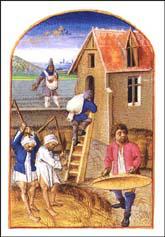Richard FitzNeal
Richard FitzNeal was born in about 1130. In 1158 the Bishop of Ely paid Henry II to appoint Richard FitzNeal his son, as his treasurer. Richard held the post for the next forty years.
In 1177 Henry II asked him to write a book about his work. The book, Dialogue Concerning the Exchequer, is an important source of information on government finances in the 12th century.
As well as being treasurer, FitzNeal was also the bishop of London from 1189 until his death in 1198.

Primary Sources
(1) In his book, Dialogue of the Exchequer, the author Richard FitzNeal includes a question from one of his pupils, (c. 1180)
Master, why do you not teach others that knowledge of the Exchequer for which vou are famous, and put it into writing lest it should die with you?
(2) In his book, Dialogue Concerning the Exchequer, Richard FitzNeal described the introduction of scutage. (c. 1180)
When the realm is threatened or attacked by enemies, the king orders that a certain sum, usually one pound, shall be paid by each knight, and from this source are derived the soldiers' wages. For King Henry prefers to expose foreign mercenaries rather than his native knights to the fortunes of war.
(3) Richard FitzNeal, Dialogue of the Exchequer (c. 1180)
After the conquest, those English who were left used to lie in wait for the dreaded and hated Normans. They killed them in secluded places.. The kings for some years inflicted the most terrible tortures on the English, yet without effect, till at length they imagined the following device. Wherever a Norman was found killed, if the killer didn't show himself or even betray himself by flight, then the whole of the district was fined.
(4) Richard FitzNeal, Dialogue Concerning the Exchequer (c. 1180)
He (William the Conqueror) dispatched the most honest men in his court on circuit throughout the kingdom. In this manner, and by these agents, a careful survey was made of the whole country.
